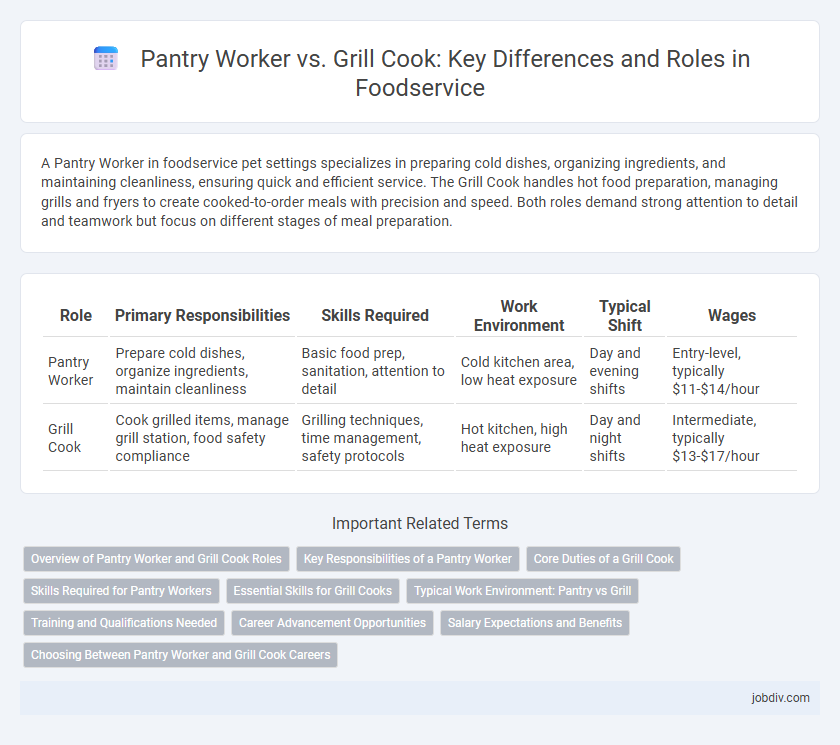A Pantry Worker in foodservice pet settings specializes in preparing cold dishes, organizing ingredients, and maintaining cleanliness, ensuring quick and efficient service. The Grill Cook handles hot food preparation, managing grills and fryers to create cooked-to-order meals with precision and speed. Both roles demand strong attention to detail and teamwork but focus on different stages of meal preparation.
Table of Comparison
| Role | Primary Responsibilities | Skills Required | Work Environment | Typical Shift | Wages |
|---|---|---|---|---|---|
| Pantry Worker | Prepare cold dishes, organize ingredients, maintain cleanliness | Basic food prep, sanitation, attention to detail | Cold kitchen area, low heat exposure | Day and evening shifts | Entry-level, typically $11-$14/hour |
| Grill Cook | Cook grilled items, manage grill station, food safety compliance | Grilling techniques, time management, safety protocols | Hot kitchen, high heat exposure | Day and night shifts | Intermediate, typically $13-$17/hour |
Overview of Pantry Worker and Grill Cook Roles
Pantry workers oversee the preparation and organization of cold dishes, salads, and desserts, ensuring timely ingredient availability and maintaining hygiene standards in the kitchen. Grill cooks specialize in cooking meats and vegetables on grills or griddles, managing precise temperature controls to deliver consistent, high-quality dishes. Both roles require coordination with kitchen staff to support efficient foodservice operations and meet customer demand.
Key Responsibilities of a Pantry Worker
Pantry workers primarily handle food preparation tasks such as washing, cutting, and organizing fresh ingredients while maintaining cleanliness and sanitation standards within the pantry area. They ensure a steady supply of prepped items to the line cooks and grill cooks, enabling efficient kitchen workflow. Their role includes inventory management and proper storage to prevent spoilage, supporting overall kitchen operations in foodservice environments.
Core Duties of a Grill Cook
A grill cook primarily handles the preparation and cooking of grilled foods, ensuring consistent product quality and food safety standards. They operate and maintain grill equipment, monitor cooking times and temperatures, and coordinate with kitchen staff to manage food orders promptly. Their core duties emphasize precision in grilling techniques, portion control, and adherence to health regulations to deliver high-quality meals.
Skills Required for Pantry Workers
Pantry workers in foodservice require strong organizational skills, attention to detail, and the ability to maintain cleanliness and food safety standards. Proficiency in basic food preparation tasks, such as chopping vegetables and assembling cold dishes, is essential. Unlike grill cooks, pantry workers must excel in multitasking and inventory management to ensure smooth kitchen operations.
Essential Skills for Grill Cooks
Grill cooks require expert knowledge of cooking temperatures and timing to ensure food safety and optimal flavor, skills less emphasized for pantry workers. Mastery of grilling equipment operation and maintenance is crucial for grill cooks to maintain efficiency and food quality. In contrast, pantry workers focus more on food preparation and cold food assembly, with fewer cooking responsibilities.
Typical Work Environment: Pantry vs Grill
Pantry workers operate in cool, organized, and fast-paced environments where food preparation and assembly are centralized, often characterized by clean surfaces and refrigerated storage. Grill cooks work in high-heat, intense settings near open flames or hot griddles, requiring constant attention to cooking times and temperatures. Both roles demand efficiency and coordination but differ significantly in thermal conditions and the physical demands of their workspace.
Training and Qualifications Needed
Pantry workers require basic food handling training and certification in food safety, emphasizing proper storage and sanitation procedures to maintain hygiene. Grill cooks need more specialized culinary training, including techniques for grilling, seasoning, and food preparation, often supported by experience in a fast-paced kitchen environment. Both roles benefit from knowledge of health regulations, but grill cooks typically require a deeper understanding of cooking methods and kitchen equipment operation.
Career Advancement Opportunities
Pantry workers in foodservice typically begin in entry-level roles focused on food preparation and inventory management, providing a foundational understanding of kitchen operations that supports lateral movement to positions such as prep cook or line cook. Grill cooks gain specialized skills in grilling and direct customer food preparation, often advancing more quickly to supervisory roles like grill station lead or kitchen supervisor due to their hands-on experience in high-demand cooking techniques. Career advancement for both positions benefits from gaining culinary certifications and cross-training in multiple kitchen stations, enhancing opportunities for promotion to sous chef or executive chef roles.
Salary Expectations and Benefits
Pantry Workers in the foodservice industry typically earn an hourly wage ranging from $12 to $16, with benefits including meal discounts and flexible schedules. Grill Cooks command higher salaries, averaging $15 to $20 per hour, often accompanied by health insurance, paid time off, and opportunities for overtime pay. Salary expectations vary based on location and experience, with Grill Cooks generally receiving more comprehensive benefits due to their higher skill requirements.
Choosing Between Pantry Worker and Grill Cook Careers
Choosing between a pantry worker and grill cook career depends on skill sets and work preferences; pantry workers excel in cold food preparation and inventory management, while grill cooks specialize in grilling and cooking hot meals under high-pressure environments. A pantry worker role often requires attention to detail and organizational skills crucial for maintaining food safety standards, whereas grill cooks need strong multitasking abilities and proficiency in handling various grilling equipment. Employment opportunities in fast-paced restaurants or catering services vary, with grill cooks typically facing more intense physical demands and pantry workers focusing on streamlined kitchen support tasks.
Pantry Worker vs Grill Cook Infographic

 jobdiv.com
jobdiv.com